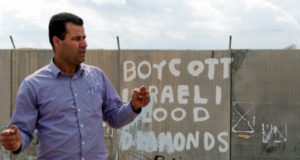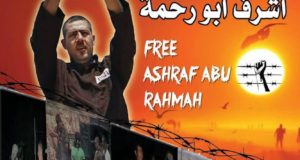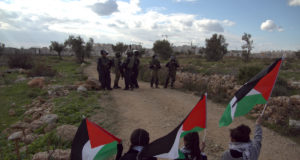By MOHAMMED KHATIB
The Seattle Post Intelligencer
seattlepi.nwsource.com/opinion/233676_arab24.html
Sunday, July 24, 2005
Israel’s planned evacuation of its illegal Gaza settlements is a positive step but it should not be mistaken for the end of Israel’s military occupation. While the world’s media focuses on Gaza, the Israeli government is using the opportunity to expand settlements in the West Bank. Throughout the current Intifada, while international attention was on killings by the Israeli military, invasions of Palestinian areas and suicide bombings, Israeli settlement expansion has continued at an accelerated rate.
In my village of Bil’in, near the West Bank city of Ramallah, Israel is building one new settlement and expanding five others on our land and the land of neighboring villages. Our village has launched a campaign of peaceful protest because Israel is building its wall on our land in order to annex the six settlements and take roughly 60 percent of our village’s 1,000 acres of land. These settlements already consume most of our area’s water. These settlements will form a city called Modi’in Illit with tens of thousands of settlers, many times the number to be evacuated from Gaza.
Even in Gaza, it is not clear that the evacuation of settlements will mean the end of Israel’s occupation. For occupation to end in Gaza, all the infrastructure of Israel’s occupation must be removed and the Palestinian Authority must be given control over everything — the borders, the air and the sea. Otherwise, Gaza will just be a big, open-air prison.
Nevertheless, the evacuation of the Israeli settlements from Gaza is an historic opportunity for Palestinians. We must seize this opportunity to free a small piece of Palestine. All the Palestinian parties should remain united, maintain the cease-fire and stop fighting one another. If we fight amongst ourselves for control of our land, none of us will control it. We must unite to take back our land.
While the spotlight is on Gaza, throughout the West Bank Israeli military occupation continues, through settlement and Wall construction, arrests and killing. For people who do not live under occupation, occupation is just a word. But for us it means much more.
The Israeli occupation has taken away our freedom of movement. I am 31 years old and I have only visited Jerusalem twice in my life, though it lies only 20 miles away. Jerusalem is the third holiest place for Muslims and the capital of our historical Palestinian state. I went there once as a child with my parents, and a second time when my son went for medical care. When my friend Ramzi was shot in the head in July by soldiers with a rubber-coated steel bullet during one of our peaceful demonstrations against the wall, even his mother was not allowed by Israeli authorities to visit him in an East Jerusalem hospital. I have also only seen the Mediterranean Sea in photos, even though it borders Palestine and sits 12 miles from my home.
Since I was a child all I’ve seen around me is the violence of occupation. Two of my best friends have been killed, one at the age of 13. He was holding a stick and an Israeli soldier shot him. They said they thought he was armed. My other friend was shot dead while simply standing in his yard at his home during the second Intifada when Israeli soldiers invaded Ramallah.
Occupation also means simple things like not being able to see my children play on the same land I played on as a child. When I was young, while my parents worked their farmland, I would often play under the olive trees near where my mother gave birth to me. Now that land has been stolen and the trees uprooted to build illegal Israeli settlements. Instead of seeing my children play under those trees, I will watch a child who is a stranger play there — a child whose family just recently came to live on our land, without any right to do so, simply because of the power of the occupation.
Because we are victims of the occupation, in my village we don’t want to continue the cycle of victimizing other children, this time Israeli children. After what the Jewish community endured during World War II, they have continued the cycle of oppression here in Palestine. In Bil’in, we have chosen to break this cycle by using nonviolent resistance to fight the occupation. We want to pass this peaceful way of resisting, which I strongly believe in, on to other villages. We want to increase the chance of peace and also reclaim our rights.
One year ago, the International Court of Justice at The Hague, the world’s highest legal body, ruled that Israel’s construction of the Wall on Palestinian land violated international law and must be stopped. Today, Palestinians in villages like ours are struggling to implement the ICJ decision and stop construction using nonviolence, but the world has done little to support us.
Bil’in is being strangled by the Wall. Though our village sits 2 1/2 miles east of the Green Line, Israel’s Wall and settlements will take more than 60 percent of our land. This land is also money to us; we work it. Bil’in’s 1,600 residents depend on farming and harvesting our olive trees for our livelihood. The Wall will turn Bil’in into an open-air prison.
After Israeli courts refused our appeals to prevent Wall construction, we, along with Israelis and people from around the world, began peacefully protesting the confiscation of our land. We have opened our homes to the Israelis who have joined us. They have become our partners in struggle. Together we send a strong message — that we can coexist in peace and security. We welcome anyone who comes to us as a guest and who works for peace and justice for both peoples, but we will resist anyone who comes as an occupier.
We have held more than 50 peaceful demonstrations since February. We learned from the experience and advice of villages like Budrus and Biddu that resisted the Wall non-violently. Palestinians from other areas now call people from Bil’in “Palestinian Gandhis.”
Our demonstrations aim to stop the bulldozers destroying our land, and to send a message about the Wall’s impacts. We’ve chained ourselves to olive trees that were being bulldozed for the Wall to show that taking trees’ lives takes the village’s life. We’ve distributed letters asking the soldiers to think before they shoot at us, explaining that we are not against the Israeli people, but against building the Wall on our land.
We refuse to be strangled by the Wall in silence. In a famous Palestinian short story “Men in the Sun,” Palestinian workers suffocate inside a tanker truck. Upon discovering them, the driver screams, “Why didn’t you bang on the sides of the tank?” We are banging; we are screaming.
Israeli soldiers act against our peaceful resistance with terror. They attack our peaceful protests with teargas, clubs, rubber-coated steel bullets and live ammunition, and have injured more than 100 villagers. They invade the village at night, entering homes, pulling families out and arresting people. They collectively punish the entire village for protesting, as the local military commander told the Israeli newspaper Ha’aretz.
At a peaceful protest in June, soldiers arrested brothers Abdullah and Rateb Abu Rahme, two village leaders. Soldiers testified that Rateb was throwing stones. A few weeks ago, an Israeli military judge ordered Rateb’s release because videotapes showed the soldiers’ claims were false.
Shortly after Abdallah and Rateb’s release, Israeli soldiers came to Abdallah’s house at 3 a.m. and ordered him to come for interrogation the next day. During the interrogation, an Israeli intelligence agent threatened Abdallah and hinted that people in Bil’in would be killed if we continued our demonstrations. Days later, Ramzi was shot in the head and seriously wounded.
During our demonstration on July 15, the marchers attempted to physically represent a bridge. We wanted to illustrate the idea that peace needs bridges, not walls, and that instead of building walls the Israeli government should invest in creating understanding and coexistence between Israelis and Palestinians. On the outskirts of the village, more than 200 soldiers awaited us in full battle gear. They again attacked our peaceful march. Abdallah and my brother Akram were violently arrested with no justification. Akram was released Thursday and Abdallah has a second hearing today.
The Palestinian people sent a message of peace through our newly elected leadership, and we implemented a cease-fire from February through early July. Still, a year after the ICJ decision, Wall and settlement construction on Palestinian land continues.
Behind the smokescreen of Israel’s Gaza withdrawal, the real story is Israel’s attempt to take control of the West Bank by building the illegal Wall and settlements that threaten to destroy dozens of villages like Bil’in and any hope for peace.
Bil’in is banging, Bil’in is screaming. Please stand with us so that we can end Israel’s occupation and achieve our freedom by peaceful means.
Mohammed Khatib is a leading member of Bil’in’s Popular Committee Against the Wall and the secretary of its village council.
 International Solidarity Movement Nonviolence. Justice. Freedom.
International Solidarity Movement Nonviolence. Justice. Freedom.


